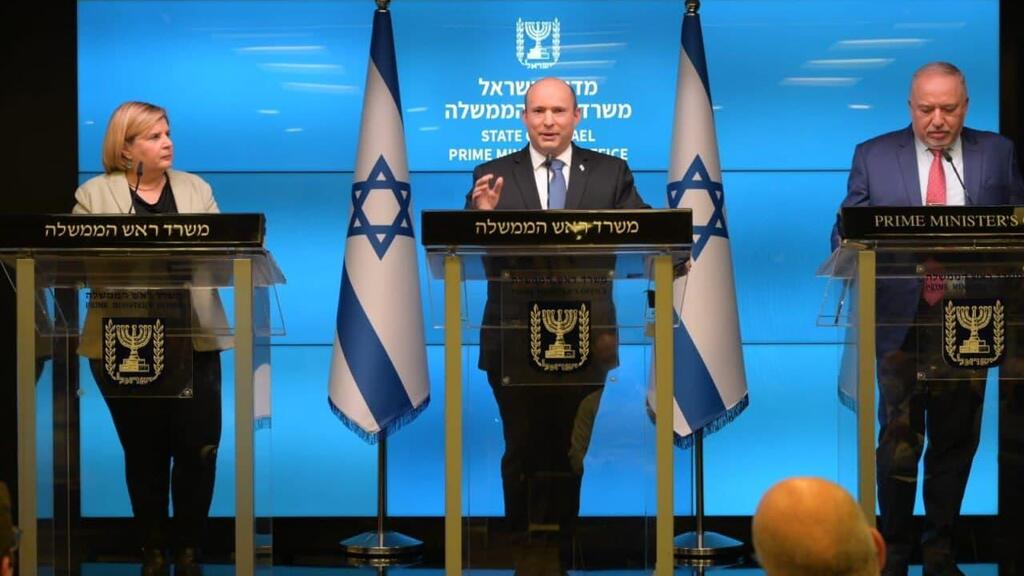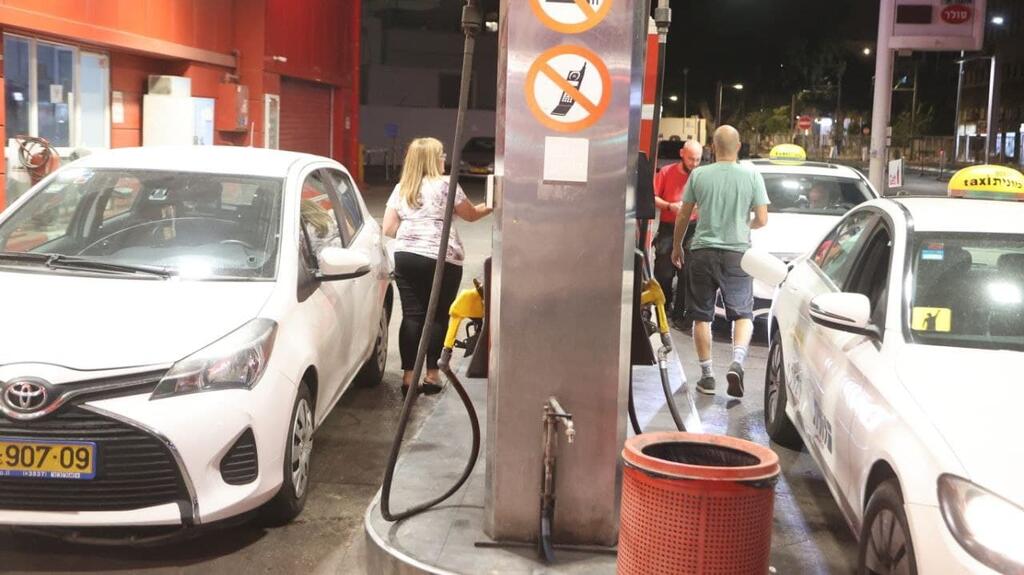The government plan to reduce the cost of living in Israel, assembled under pressure and revised last-minute, isn't perfect.
The government announced the details of the plan, which is unlikely to solve the high prices in Israel in comparison to other developed countries. The plan is mostly meant to help parents while excluding the elderly, singles, and handicapped people who certainly suffer from the increasing cost of living as nonetheless.
4 View gallery


Economy Minister Orna Barbiavi, Prime Minister Naftali Bennett and Finance Minister Avigdor Liberman announce the government's economic plan to ease cost of living, February 9, 2022
(Photo: GPO)
The plan included steps that are meant to try to brake price inflation for the sake of consumers on one hand while trying to help the weaker and poorer wings of society raise their income. Still, all the steps of the plan require approval of Knesset's Finance Committee before coming into play, thus it's unknown when they will be initiated.
Now for the Q&A:
Who will reap the most benefits?
Parents. According to the plan, they will receive a raise in salary, through a tax credit return of up to NIS 223 ($70) per working parent for every child between the age of 6 and 12 throughout all of 2022. The annual total of this benefit could read up to NIS 5,332 ($1,666) per year for 530,000 parents, costing the state NIS 2.1 billion ($ 656 million).
Will all parents receive tax credit returns?
No, only to working parents. More so, any employee that makes less than the minimum wage salary of NIS 5,300 ($ 1,656) and is exempt from paying taxes will not be eligible for this benefit. In addition, it's unclear why the age limit for eligibility stops at 12.
Will there be additional aid to parents?
For some. Subsidization of daycare services will be granted to mid-income clusters of Israel - including Arad, Be'er Sheva, Ashdod, Lod, Tiberias, and more. NIS 250 ($78) per month will be granted to parents of toddlers. This benefit excludes most Israeli parents.
Aid for those making especially low salaries?
Working parents with low salaries will receive a 20% raise in working bonuses, averaging NIS 800 ($250). This applies to about 300,000 workers who will receive an additional NIS 67 ($21) per month on average.
4 View gallery


Protesters demonstrate against economic hardship of small business owners amid COVID pandemic outside the Knesset last week
(Photo: Moti Kimchi)
Independent workers?
Nope. The plan included only a "declaration of purpose" to compensate independent business owners. Due to disagreement within the government, they have yet to come up with a plan.
And what about price inflation?
The plan includes tax cuts for a laundry list of products, which up until now have been taxed at a rate of about 12%. Taxes on mattresses, blankets, pillows, furniture, hygienic pads, kitchenware, floorboards, sinks, baths, medical equipment, car parts, electronic bikes, and car batteries will go down to 0%.
Wait, what about food prices?
Taxation will be reduced to 0% on meat import, fish, flour, ketchup and sauces, sunflower seeds, sausages, and dried fruits. Taxes on eggs, honey, and olive oil will be raised.
4 View gallery


Protesters demonstrate against rising cost of living in Israel, Tel Aviv
(Photo: Shahar Goldstein)
Wait... what about food prices at the supermarket for the individual consumer?
No one promises Israelis that custom reductions on imports will reach our shopping cart. This reminds us of past plans that essentially benefited the merchants rather than the consumers.
Electricity prices?
Yes! Even though those are still expected to increase by 3.4%, that is still better than the 5.7% hike originally planned for February. Don't get too excited though, this is temporary and dependent on global coal prices.
And what about gas prices
Unfortunately, those were left out. There was no debate on the issue within the government. Israel will continue to collect up to 70% tax per liter — a world record.
Will there be agricultural reforms?
This too was excluded from the plan. Farmers are enraged, and while this is still in discussion, it seems Israeli agriculture will struggle to survive in a competitive market.
Will it make a dent in inflating prices?
Hardly, the plan is mostly set out to spare the government from the public's slings and arrows. The cost of living will stay the same as it has been for the last two decades.
How much will this cost Israel?
NIS 4.4 billion ($1.38 billion)! Hope it's worth it...


